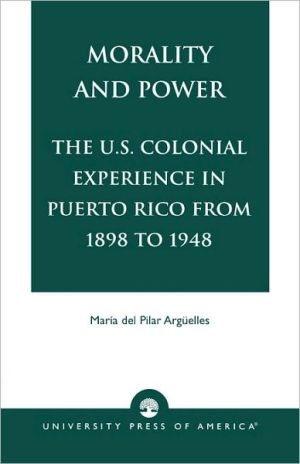

 |

|

The average rating for Morality And Power based on 2 reviews is 3 stars.
Review # 1 was written on 2011-11-01 00:00:00 Dan Baggio Dan BaggioRuth H. Bloch, "Religion and Ideological Change in the American Revolution," in Mark A. Noll, ed., Religion and American Politics: From the Colonial Period to the 1980s (New York, 1990), 44-61. In this contribution to intellectual history, Bloch joins a long line of historians in examining the impact of religion on the ideology of the Revolution. Starting with the Revolutionary clergy themselves, the role of religion in the Revolution has been a continuous debate. Since the Progressive Historians derogated the role of religion in favor of more materialist explanations, there has been a revival of emphasis on the role of religion in the revolution. Yet the debate has been over the interplay between the religious and the secular. Bloch abjures this dichotomy and simply focuses on ideas that were specifically religious. Along with David Hall, she identifies the main ideological contribution of religion in the Revolution as a Calvinist contribution, a preoccupation with the central themes of the Protestant Reformation. First, the Calvinist impulse brought a focus on experiential salvation. Second, it was preoccupied with defining the community of the Elect as guided by Providence. Ideas of the American mission and the nationalism that emerged out of it, were definitively shaped by this Calvinist dialogue. "Far from having become secularized by the eighteenth century, the religious preoccupations that had always informed political ideology remained vitally important to the Revolutionary generation." (p. 47) 1763-1774 During this phase of resistance to the British colonial power, not only was the ideology of the country Whig at work but there were also substantial components of Calvinist discourse in the mix. "American Calvinist concerns about the godly community and the conditions of grace found immediate expression within the patriot discourse." (p. 48) As Harry Stout has shown, covenant theology was in fact NOT buried by the Great Awakening but existed in a great continuum spanning the early days of colonial America all the way up to the Revolution. In addition to the country Whig idealization of the colonial past one can add the Calvinist idealization of a covenanted Christian past of early colonial history. Patriots "simply presumed the New England tradition to be both Christian and free." (p. 49) Covenant theology tended toward Manichean dualism. Anti-Catholicism was the link between the British and the Antichrist. Beyond Manichean dualism, there was the fundamental conception of religious liberty which inspired the colonists to fight against the French Catholics in the French and Indian War. Especially, but not only, in New England the categories of the religious and the political were collapsed to the extent that one becomes virtually unintelligible without the other. Terms like "virtue," "corruption," and "liberty" had both religious and political significance -- to try to understand one set of meanings without the other is to miss the point entirely. 1774-1778 The basic dichotomy between the community of the elect and that of the antichrist persistent into the period of open rebellion. Yet the ideology underwent transformation as a result of the Coercive Acts of 1774 and the Quebec Act which protected Catholicism in Canada. As Harry Stout has pointed out, after 1775 even the New England clergy began to enlarge the scope of the covenant to include more than New England and embraced the entire nation. Additionally, millenarian hopes shaped the Revolutionaries' vision of the future. Millennial symbolism was a standard feature of much American Protestantism of the late colonial period, weaving in and out of providential theories about the meaning of contemporary events. It was, however, only in the mid-1770s that this symbolism came to pervade Revolutionary ideology, enabling Americans to perceive the outbreak of war and assertion of national independence as steps toward the realization of God's Kingdom on Earth. (p. 53) As the Revolution proceeded, the godly community and the new republican state became one in the rhetoric of revolution. This forcible association of the godly with the republic served to legitimate the cause and even provoked a rally to the flag in the form of military enlistments early in the war. 1778-1789 This period, known as the period of disillusionment, was the time that literally "tried men's souls." It was the period in which American's doubted their special calling, a period in which - as Gordon Wood has pointed out - the Revolutionaries decried both a moral and a political decline in the patriot cause. For Gordon Wood, the Constitution provided a way out of the moral problem by divesting the government of the need to rely upon the virtue of its citizenry. Yet, by looking at the religious pronouncements of the historical actors one could envision another interpretation. As the Millennial impulse receded, it was replaced by the jeremiad and a vision of the Apocalypse. After the victory on the battlefield, the secular and the sacred were going their separate ways. Relying now on checks and balances to provide good government, as Daniel Howe has pointed out custodianship for government virtue passed to the wise statesman. Religion increasingly called the people to voluntarism to secure public virtue. Here we see the beginnings of the reform movements of the next century. Divested of its association with the state the strong religious nationalism found its fulfillment in public volunteerism. |
Review # 2 was written on 2016-03-04 00:00:00 William Reeb William ReebThe chapters by Stout and Hatch were really well researched and written. |
CAN'T FIND WHAT YOU'RE LOOKING FOR? CLICK HERE!!!